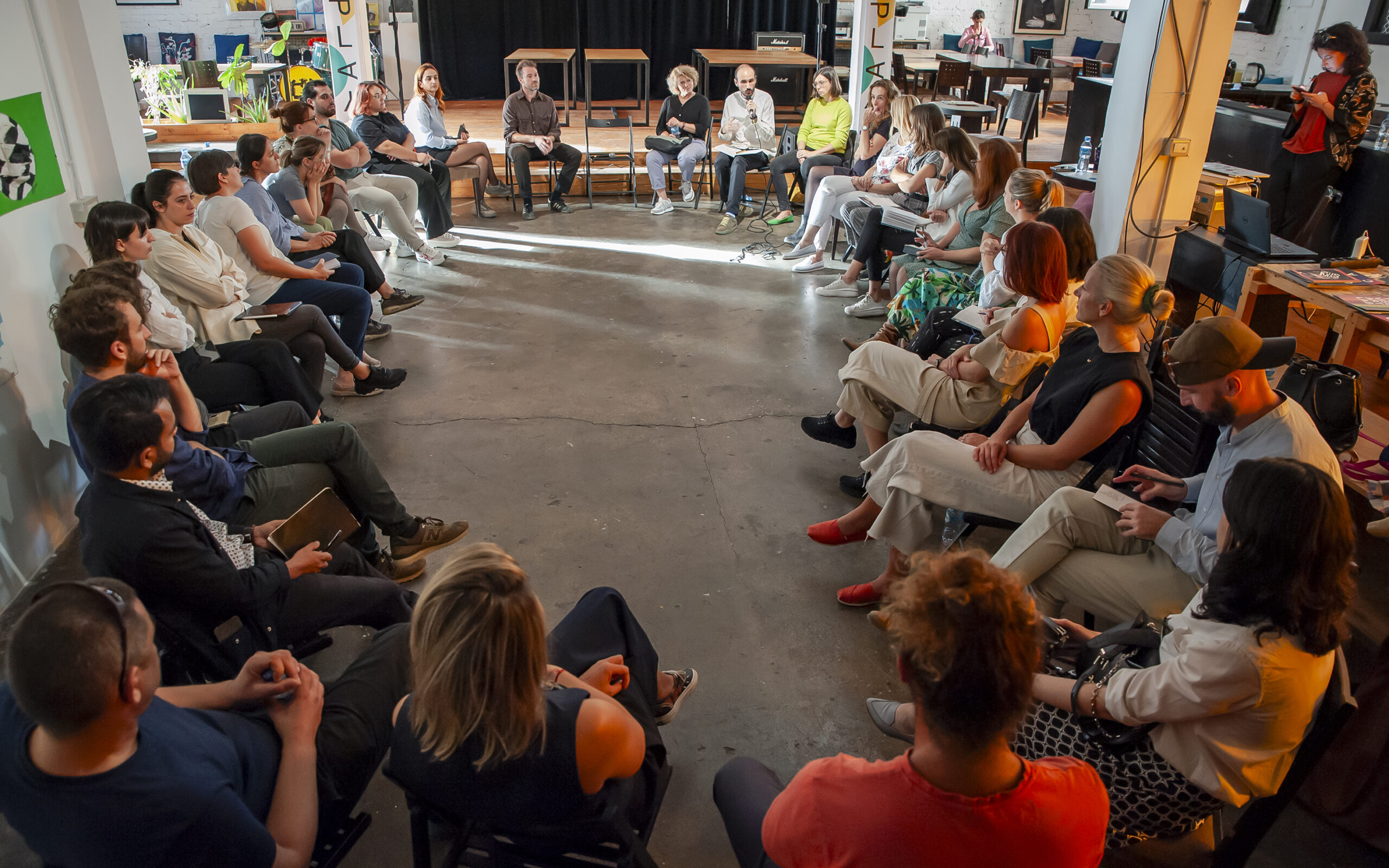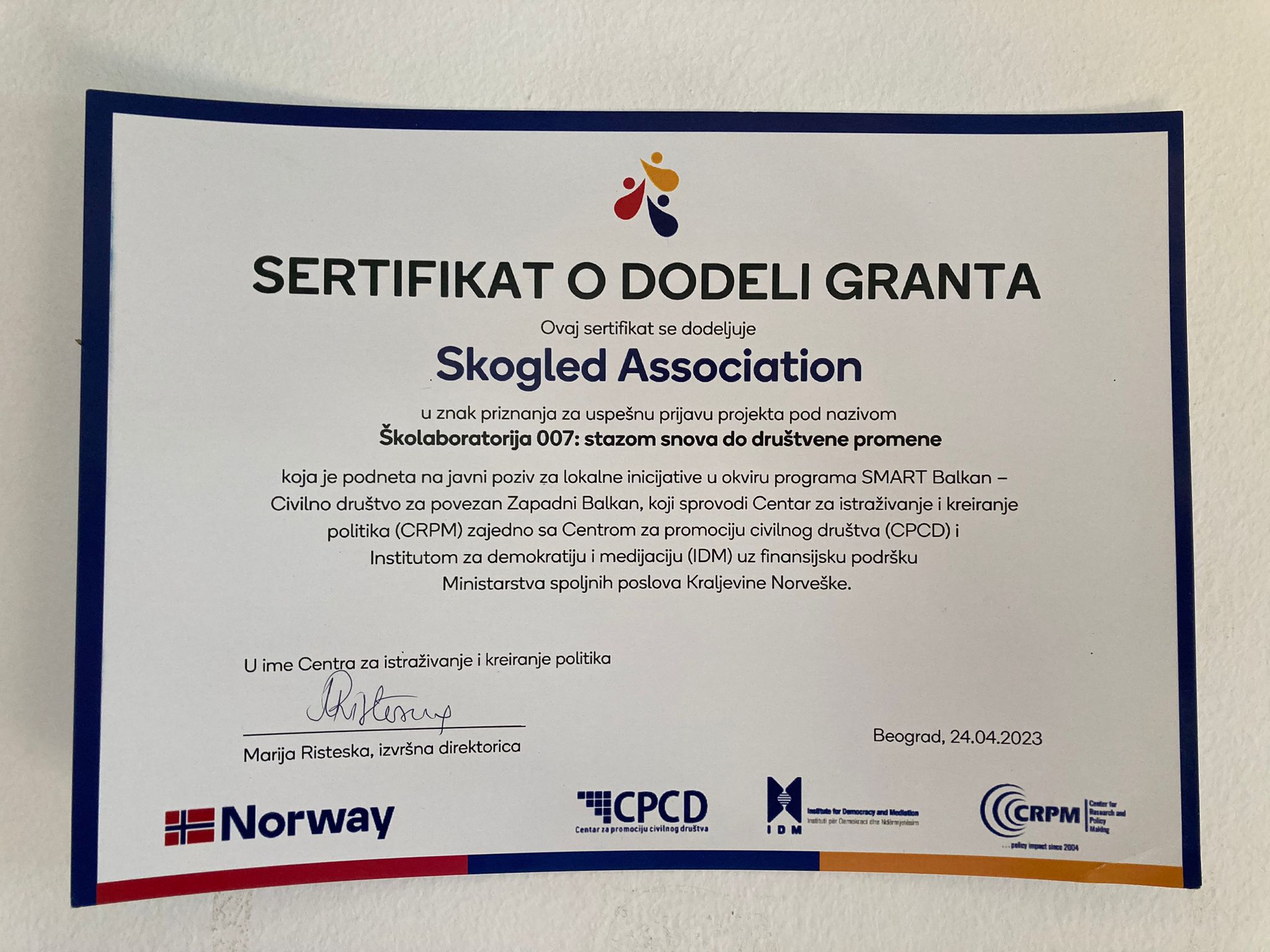
Tirana, 24.-26. November 2023 – A three-year project co-funded by the Creative Europe programme brought together world play experts and enthusiasts from the 24th to the 26th of October in Tirana, Albania.
The RE:Play partnership and friends on the Tirana Good Practices Tour during the conference. Photo credits: Društvo Pazi!park
RE:PLAY stands for Redesigning playscapes with children in the Western Balkans, a project supported and established within the Creative Europe programme. Five organisations coming from Slovenia (Pazi!park), Croatia (Kreativni krajobrazi), Serbia (Škograd), Montenegro (Gradionica) and Albania (Qendra Marrëdhënie) joined forces in this collaborative endeavour of bringing more accessible play opportunities and more inspiring play environments to cities in the Western Balkans region. The project’s main focus was predominantly rethinking schoolyards into natural playscapes that enable children to thrive during and beyond school hours.
The conference was attended by some 50 practitioners, architects and city staff from the region and Europe who were all able to share, exchange and learn through sharing the work of RE:PLAY and partners Studio Ludo (Philadelphia, USA); Metalude (Montreal, CA); Superpool (Istanbul, TR), Filter Café Filtré (Brussels, BE) and Grün macht Schule (Berlin, DE)
Director General of the Tirana Agency for Parks and Recreations, Ms. Anisa Ruseti, was able to share the city’s latest efforts in improving access to public play through additions of public playgrounds and programs such as “Community Schools” which in 2022 announced that the schoolyards and gym facilities of primary and high schools across the municipality will be open for public access after class hours. The decision affected both urban and rural schoolyards, expanding neighbourhood play options and reducing families’ need to drive for recreation. RE: PLAY was able to contribute to piloting the concept of a green schoolyard within this scheme involving children as designers in what the partners are hoping becomes embedded in local policy.
Ms. Anisa Ruseti, Head of Agency of Parks and Recreation addressing the conference audience at Tulla Culture Centre in Tirana, 2023. Photo credits: Društvo Pazi!park
To envision how schoolyards can best serve younger children, the elderly, and caregivers, the RE:PLAY pilot project in 5 cities across the Balkans is still looking at ways to transform schoolyards into green, climate-resilient, park-like environments by engaging the main actors as designers in the process. Children in Ljubljana, Zagreb, Belgrade, Bar and Tirana were part of engagement activities such as workshops, celebrations, outdoor classes and summer schools starting from 2020 and concluding in 2023. Partners were able to show during the conference how for the past three years project partners were able to enable children to think out loud and co-design space with experts of play and come up with meaningful play spaces now built in their schools.
According to Ms. Ruseti this new approach to public space design is a shift in community space making where beyond being associated with availability of a place, play becomes an act of learning and social interaction. “We see this as an investment in the future of the city, not merely an innovation of how play space is designed,” said Ms. Ruseti. “This initiative to rethink the grey and largely asphalted spaces, could be expanded to more schools around the city if successful with local residents. Mothers or grandparents who want to take a walk to a quiet place off the street with a stroller in the evenings may find schoolyards are an ideal place to do so.”
The week was finalised with a street party on the Gustav Mayer school block, the most recently implemented school street project by Qendra Marrëdhënie attended by some 300 local kids. RE:PLAY partners together with the City of Tirana were able to organise and engage with children through street play, music, sports, painting and even a cooking session of making pasta from scratch. The closing event encapsulated the essence of this project – playing and enjoying the common urban space as it is meant to be, a thriving supporting space for children and their caregivers.
Street party in front of Gustav Mayer school, Photo credits: Qendra Marrëdhënie
The successful culmination of the RE:PLAY project marked not just the end of a three-year initiative but the beginning of a transformative journey in redefining the way we view and design play spaces. As we bid farewell to this remarkable collaborative effort, we look forward to a future where the principles of creativity, inclusivity, and elevated standards in playscape design become the norm. RE:PLAY has not only reshaped schoolyards in the Western Balkans but has set a precedent for a global movement towards providing enriched, natural environments for urban children. With the support from the Engaged Fund for Balkans, partners from Serbia, Albania, and Montenegro are taking a bold step forward, launching a new project that inherits the partnership and work of RE:PLAY. This regional network will serve as a think-tank-act hub, ensuring the continuation and amplification of the impactful work carried out throughout the project. As the echoes of laughter from the Gustav Mayer school block street party linger, we celebrate the lasting impact of RE:PLAY and anticipate a future where every child can thrive in stimulating, imaginative, and unstructured play spaces.


